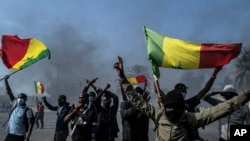The amnesty is part of President Macky Sall's response to the turmoil sparked by his last-minute postponement of the presidential election, originally scheduled for February 25.
The poll delay triggered deadly protests in the traditionally stable West African country, which is still awaiting a new election date.
In a bid to bring "appeasement to the political space," Sall proposed the amnesty bill which was adopted by the Council of Ministers last week.
The law committee adopted the text on Tuesday, the committee chairman, Moussa Diakhate, and an opposition MP told AFP.
The latter said the bill would be put to a plenary vote in the National Assembly on Wednesday.
The amnesty would cover "all acts likely to be classified as criminal or correctional offences committed between February 1, 2021 and February 25, 2024, both in Senegal and abroad, relating to demonstrations or having political motivations," according to a document authenticated by a parliamentary source.
The protests, linked to the bitter stand-off between the state and now-detained opposition figure Ousmane Sonko, led to hundreds of opposition arrests, dozens of deaths and major damage to property.
It is not known whether Sonko or his back-up candidate in the presidential race, Bassirou Diomaye Faye, who is also in prison, would be affected by the amnesty.
The bill was drawn up with the aim of "calming the political and social climate," according to the presidency, and while covering a specific period of events, does not name individuals.
Moussa Sarr, a lawyer handling the cases of dozens of imprisoned opponents, said those arrested in connection with the demonstrations would be released as soon as the law was published, and the charges would be dropped.
Several hundred opponents have been provisionally released by authorities since mid-February.
'This is not justice'
Much of the opposition has spoken out against the proposed amnesty, denouncing a "denial of justice" amid fears it will be used to exonerate government and security officials for the deaths of protesters.
The bill is also not unanimously supported by the president's parliamentary camp, which holds a precarious majority.
Amnesty International has described the move as "an affront to victims of the violence and a troubling endorsement of impunity."
"Although the amnesty law may effectively end legal proceedings against people arbitrarily detained in connection with the demonstrations, it fails to prosecute those suspected of criminal responsibility for the deadly crackdown on protesters," said Seydi Gassama, Executive Director of Amnesty International Senegal.
"This is not justice."
Sall on Monday received the conclusions of a "national dialogue" recommending elections be held on June 2 and suggesting he remain in office until his successor is installed.
The president has been in power since 2012 but is not seeking re-election. He has said he will seek the opinion of the Constitutional Council, as the opposition continues calls for an election before his mandate ends on April 2.











Forum